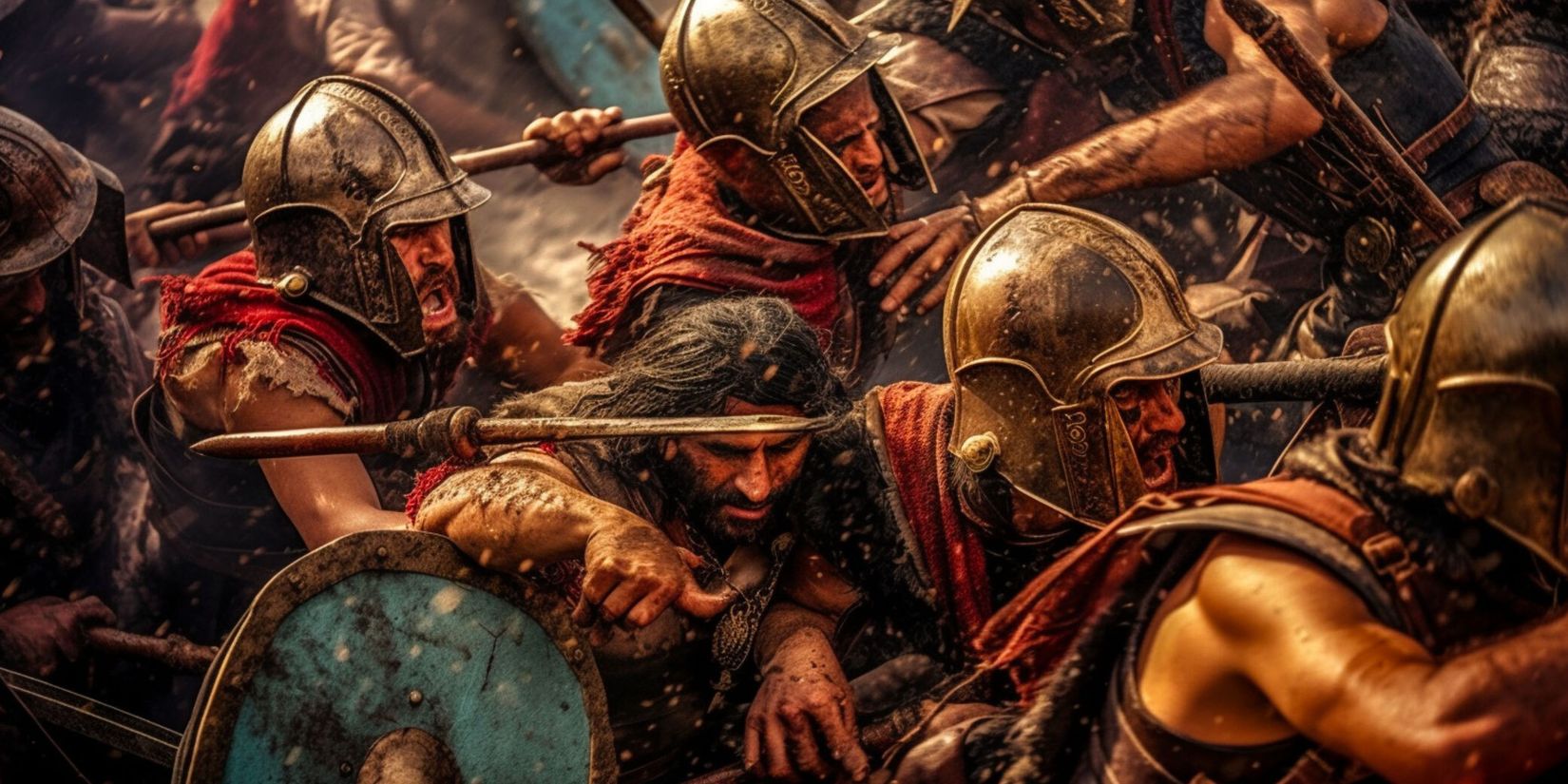
What sparked the fierce rivalry between Messenia and Sparta? The First Messenian War, lasting from 743 to 724 BC, was a pivotal conflict that shaped ancient Greek history. This war pitted the Achaeans of Messenia against the Dorians of Sparta, driven by deep-rooted territorial disputes and cultural differences. The immediate catalyst was an incident involving the theft of cattle from a Messenian Olympic champion, escalating tensions to a full-blown war. Spartan leaders like Alcmenes and Polydorus clashed with Messenian leaders such as King Euphaes. The war ended with a Spartan victory, leading to the subjugation of the Messenians and their reduction to helot status, profoundly impacting the socio-economic landscape of classical Sparta.
Key Takeaways:
- The First Messenian War, lasting 20 years, was a clash between Messenia and Sparta, resulting in a Spartan victory and the creation of a helot population, shaping the socio-economic landscape of classical Sparta.
- The war, sparked by cultural differences and territorial disputes, led to the subjugation of Messenia and the emergence of classical Sparta's wealth and culture, with lasting implications for the region's history.
The First Messenian War: A Clash of Titans
The First Messenian War was a significant conflict in ancient Greek history, fought between the city-states of Messenia and Sparta. This war, which lasted from 743 to 724 BC, had profound implications for the political, social, and cultural landscape of the Peloponnese region. Let's dive into 30 key facts about this pivotal event.
Duration and Belligerents
Understanding the timeline and the main players involved sets the stage for grasping the war's impact.
- Duration: The First Messenian War lasted for approximately 20 years, from 743 to 724 BC.
- Belligerents: The war was fought between Messenia, an ancient region in the Peloponnese, and Sparta, another prominent city-state in the same region.
Causes and Catalysts
The roots of the conflict and the sparks that ignited it reveal the deep-seated tensions between the two city-states.
- Causes: The conflict was rooted in a long-standing rivalry between the Achaeans (the inhabitants of Messenia) and the Dorians (the inhabitants of Sparta). This rivalry was exacerbated by territorial disputes and cultural differences.
- Inciting Incident: The war began with an incident involving the Temple of Artemis Limnatis. Messenians allegedly harassed maidens performing a ritual during a festival, which escalated tensions between the two city-states.
- Immediate Catalyst: The immediate catalyst for the war was the theft of cattle belonging to a Messenian Olympic champion. The champion had leased the land from some Spartans, and the theft was seen as a provocation.
Leadership and Military Strength
The leaders and their armies played crucial roles in the unfolding of the war.
- Spartan Leaders: Alcmenes and Polydorus were Agiad kings, while Theopompus was an Eurypontid king.
- Messenian Leaders: Euphaes, the king of Messenia, son of Antiochus, grandson of Phintas, and Cleonnis.
- Military Strength: Sparta had a maximum of 3,000 infantry and 1,500 cavalry.
- Messenia: Roughly the same strength as the Spartans.
Casualties and Outcome
The toll of the war and its conclusion had lasting effects on both city-states.
- Casualties and Losses: Sparta suffered 1,800 casualties.
- Messenia: Messenia had 2,700 casualties.
- Outcome: The war resulted in a Spartan victory. Messenia was depopulated by emigration of the Achaeans to other states, and those who remained were reduced to helots (serfs).
Socio-Economic Impact and Helot Status
The aftermath of the war reshaped the socio-economic landscape of the region.
- Helot Status: The descendants of the Messenians who did not emigrate were held in hereditary servitude for centuries until the collapse of the Spartan state in 370 BC.
- Socio-Economic Impact: The war marked the beginning of a new socio-economic basis for classical Sparta, which emerged from this conflict and expansion.
Second Messenian War and Archaeological Evidence
The First Messenian War set the stage for future conflicts and left behind traces in the archaeological record.
- Second Messenian War: A helot revolt in 685 BC led to the Second Messenian War, which further solidified Spartan control over Messenia.
- Archaeological Evidence: There is limited archaeological evidence for the First Messenian War, as most evidence of violence from this period is ambiguous and not directly linked to the conflict.
Literary Sources and Mythological Context
Ancient texts and myths provide valuable insights into the war, though they must be read with caution.
- Tyrtaios: A poet whose works have been handed down to us only in fragments, Tyrtaios is one of the few reliable literary sources for the war.
- Pausanias: An ancient Greek traveler and geographer, Pausanias provides dates for the war (743-724 BC) and some details about its events.
- Diodoros' Library of History: This source, though fragmentary, offers additional information about the war based on earlier authors like Myron of Priene and Rhianos of Bene.
- Mythological Context: The narrative of the First Messenian War is often fantastical and riddled with anachronisms, suggesting that it should be read in the context of the Messenians' desire for an ethnic origin story after their liberation in 370 BC.
Key Battles and Strategies
The tactics and key engagements of the war reveal the strategic minds of the leaders involved.
- Euphaes' Strategy: Euphaes, the king of Messenia, decided to bring the war to the Spartans by constructing a fortified base near Ampheia. This strategic move aimed to remove the Spartan presence from Messenian territory.
- Battle of Ampheia: The Messenians and Spartans clashed in the middle between Ithome and Taygetus. Euphaes chose his ground carefully, selecting a site with one side bordering an impassable ravine between the two armies.
- Fall of Mt. Ithome: The Spartans eventually captured Mt. Ithome, leading to the defeat of the Messenians. Many Messenians either fled abroad or were captured and enslaved.
Legends and Cultural Impact
The war left a lasting legacy in the form of legends and cultural shifts.
- Aristodemus' Legend: The legend of King Aristodemus, who sacrificed his daughter to the gods of the underworld in an attempt to enlist their aid against the invading Spartans, reflects the deep-seated resentment and despair felt by the Messenian helots.
- Spartan Wealth and Culture: The First Messenian War marked a significant increase in Spartan wealth and culture. This period saw the emergence of classical Sparta's socio-economic basis.
- Helot Revolts: The subjugation of Messenia led to the creation of a large helot population. This population was a source of constant tension and led to several helot revolts throughout Spartan history.
Historical Debate and Modern Historiography
Scholars continue to debate the war's historical accuracy and its portrayal in ancient texts.
- Historical Debate: There is ongoing debate among scholars about the historical accuracy of the accounts provided by Tyrtaios, Pausanias, and other ancient sources. Some scholars doubt whether the war even happened at all.
- Archaeological Criticism: Archaeologists have been criticized for assuming that all evidence of violence must relate to the First Messenian War, ignoring other possible explanations for archaeological findings.
- Modern Historiography: Nino Luraghi's "The Ancient Messenians" (2008) provides a detailed analysis of Messenian history and culture, including the First Messenian War.
- Daniel Ogden's Aristomenes of Messene: Legends of Sparta's Nemesis (2004): This book explores the legends surrounding the Messenian Wars, including the First Messenian War.
The Lasting Impact of the First Messenian War
The First Messenian War was a game-changer in ancient Greek history. Spanning from 743 to 724 BC, this conflict between Messenia and Sparta reshaped the political and social landscape of the Peloponnese. The war's outcome, a Spartan victory, led to the subjugation of the Messenians, turning many into helots. This shift laid the groundwork for Sparta's future dominance and wealth. The war also sparked the Second Messenian War and left a legacy of helot revolts that plagued Sparta for centuries. Despite limited archaeological evidence, literary sources like Tyrtaios and Pausanias provide valuable insights. The war's cultural and economic impacts were profound, influencing the region's development. Understanding this conflict offers a glimpse into the complexities of ancient Greek society and the enduring rivalry between Achaeans and Dorians.
Frequently Asked Questions
Was this page helpful?
Our commitment to delivering trustworthy and engaging content is at the heart of what we do. Each fact on our site is contributed by real users like you, bringing a wealth of diverse insights and information. To ensure the highest standards of accuracy and reliability, our dedicated editors meticulously review each submission. This process guarantees that the facts we share are not only fascinating but also credible. Trust in our commitment to quality and authenticity as you explore and learn with us.


